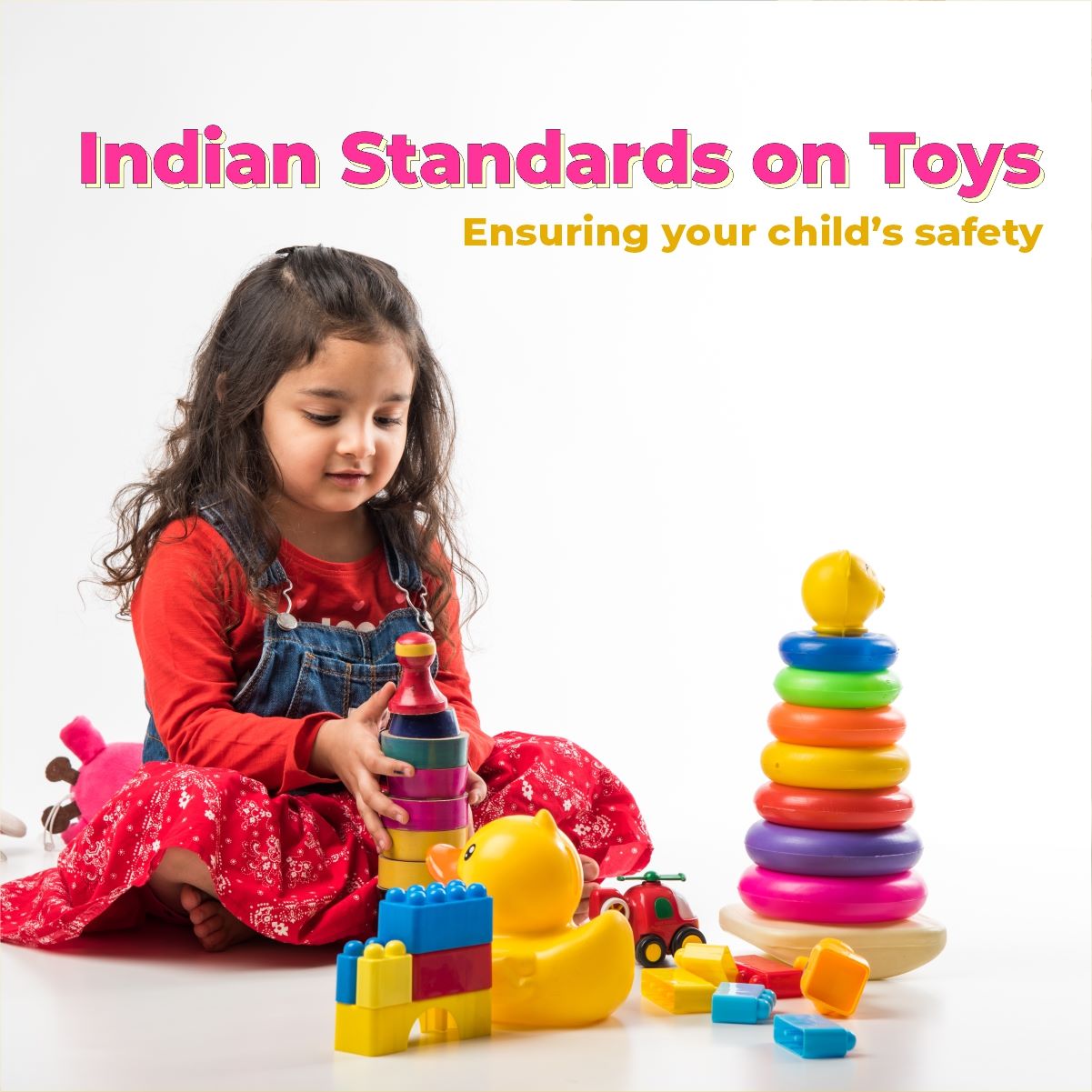

Parents of young children are generally concerned about the safety of toys, as unsafe toys pose various risks to children. These risks include the danger of choking on small toys or toy parts, physical injury from toys with sharp edges or points and potential health issues caused by toxic elements in toy materials such as plastics, paints, and fabrics. To address these risks, BIS has published several Indian Standards on the safety of toys (prescribing requirements for physical, chemical and electrical safety of toys). These Indian Standards are aligned with the existing International Standards for toy safety i.e., Standards formulated by the International Organization for Standardization (ISO) and International Electrotechnical Commission (IEC).
The Department for Promotion of Industry and Internal Trade (DPIIT), Ministry of Commerce and Industry, Government of India, has issued the toys Quality Control Order (QCO), 2020, under Section 16 of the BIS Act, 2016. This Quality Control Order makes it mandatory for children’s toys to conform to 7 Indian Standards for safety of toys and bear the ISI Mark under a licence from BIS. The QCO came into effect on January 1, 2021. Accordingly, no person is permitted to manufacture, import, sell or distribute, store, hire, lease or exhibit for sale toys that do not conform to the Indian Standard and do not bear the “ISI” mark under a licence from BIS.
There are 7 Indian Standards referred in the QCO, each of which addresses different aspects of toy safety.
• IS 9873 (Part 1): 2019 deals with physical and mechanical safety aspects, i.e., tests are prescribed to see if toys present a choking hazard or have sharp points or edges that can injure a child, have clearances that can cause a child’s finger to get crushed, etc.
• IS 9873 (Part 2): 2017 deals with flammability aspects, i.e., tests to determine that certain toys shall not catch fire and cause burns to children.
• IS 9873 (Part 3): 2017 and IS 9873 (Part 9): 2017 prescribe safe limits for toxic elements like cadmium, mercury, selenium and certain phthalate esters in toys.
• IS 9873 (Part 4):2016 deals with the safety of activity toys like swings, slides, etc.
• IS 9873 (Part 7):2017 prescribes requirements for finger paints, which are used in toy craft kits, etc., to be tested for various physical, chemical and electrical safety requirements to ensure that they are safe for children.
• IS 15644:2006 addresses aspects related to the electrical safety of toys.
BIS grants licences to toy manufacturing units to use the ISI mark on toys, based on an assessment of their manufacturing and testing capability through a factory visit as well as testing of toys in a BIS lab or BIS-recognized labs as per the Indian Standards.
Toy manufacturing units holding BIS licences are required to ensure that the toys manufactured by them undergo regular testing and follow a defined scheme of inspection and testing. As part of its market and factory surveillance activities, BIS conducts surveillance visits at the licenced toy manufacturing units and collects toy samples from both factories and the market. These samples are then tested at BIS labs or other labs recognized by BIS.
As part of its factory and market surveillance activities, BIS has tested nearly 2500 samples of toys drawn from factories and markets until January, 2023. The majority of these samples (around 83%) have been found to be meeting Indian Standards, whereas only around 17% have failed to meet certain requirements related to constructional and labelling parameters and in these cases the manufacturers have been advised to take suitable corrective actions.
To ensure enforcement of the Toys QCO, BIS has conducted enforcement raids across the country until January 2023, targeting establishments that were found to be in violation of the Toys QCO by selling toys without the ISI mark. These raids have resulted in the seizure of a large quantity of non-ISI marked toys.
BIS has been interacting regularly with the toy industry to understand and address their concerns and facilitate the industry in implementing Indian Standards and BIS certification for toy safety. BIS also conducts capsule courses to train Indian toy manufacturers regarding quality control and testing of toys as per Indian Standards. Through a multi-pronged approach, BIS has helped pave the way for making safe toys available to children in India and making the Indian toy industry self-reliant in the manufacturing of safe toys that conform to Indian Standards.
In conclusion, the Toys QCO and BIS standards on toys play a crucial role in ensuring the safety of toys for children. With the strict enforcement of the Toys QCO, BIS has significantly improved the level of compliance of toys with safety standards. Parents can now purchase toys with assurance, knowing that they bear the ISI mark, ensuring their children’s safety.
Go Back